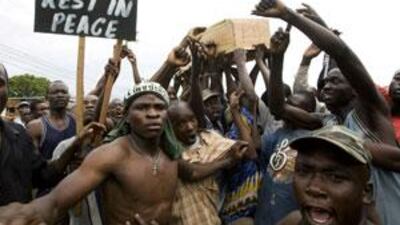NAIROBI // There was unity and hope two years ago as rival Kenyan politicians sat next to each other to sign a peace deal that created a coalition government and ended months of violent unrest. This week, however, as Kenya marked the two-year anniversary of the peace accord, hope appears to have faded and the unified coalition has unravelled.
Mwai Kibaki, the president, and Raila Odinga, the prime minister, appealed for unity even as they were locked in a power struggle that could disrupt the government at a critical time. Leaders are attempting to draft a new constitution that they hope will reform state institutions and avoid the bloody fighting that marred the 2007 election. "I am sure that if we remain united as we have, the country will indeed be prosperous," Mr Kibaki said in a televised speech. "This is what we want for the country. Let us all seek what is great for Kenya and achieve it."
Mr Kibaki and Mr Odinga contested a close election that observers said was fraught with irregularities. After Mr Kibaki claimed victory, violence erupted along tribal lines. Kofi Annan, the former United Nations secretary general, negotiated a peace accord ending the bloodshed that killed 1,300 people. Mr Odinga agreed to share power with Mr Kibaki, but the two have recently been at loggerheads over Mr Odinga's attempt to suspend two ministers for fraud allegations. Mr Kibaki says Mr Odinga does not have the power to discipline ministers.
According to a new poll, 60 per cent of Kenyans say the political instability threatens to derail the drafting of the constitution. Most Kenyans say political instability and corruption are the most important issues facing the country, according to the poll by the Nairobi-based Strategic PR. "Political instability is obviously on the rise since it was not among the top five issues the last time we did a survey," Caesar Handa, head of Strategic PR, told the local Daily Nation newspaper.
Analysts say that Kenya is at a crossroads. Politicians must draft a new constitution, reform the police and judiciary and bring to justice the perpetrators of the post-election violence before the next election in just over two years, according to Michael Ranneberger, the US ambassador to Kenya. The US put pressure on Kenya to create the coalition government. "During the past two years there has been some progress in implementing the reform agenda," Mr Ranneberger said in a statement. "However, much more remains to be accomplished. Much more must be done to foster national reconciliation and cohesion."
An independent commission found that some top politicians organised the post-election violence. Political leaders have refused to set up a special court to try the suspects, instead opting for a truth and reconciliation commission. The commission chairman is under fire for his involvement in past injustices. The International Criminal Court in The Hague has also started investigating Kenyan politicians' role in the violence.
Meanwhile, parliament is currently debating a draft constitution that could reform the judiciary and reign-in government spending. The constitution would save taxpayers millions by reducing the size of the cabinet, currently one of the largest in the world, from 98 ministers and deputy ministers to 24 ministers. The draft bill also removes the position of prime minister, which was created specifically for Mr Odinga two years ago. Kenyans will vote on the new constitution in a referendum later this year.
"The proposed constitution of Kenya attempts to capture the consensus achieved by parliament without sacrificing the views of Kenyans," said the final report from the constitution drafting committee. Mr Odinga called on Kenyan leaders to back the constitution and not use the process for political grandstanding. "The constitution making process is well on course and has in fact reached a critical stage," he said during a speech to mark the anniversary of the peace deal. "We should desist from making utterances that could scuttle the process."
Analysts say there are signs that politicians have already started manoeuvring for the 2012 presidential election. Mr Odinga this week travelled to central Kenya giving speeches in what appeared to be a campaign trip. William Ruto, a former ally of Mr Odinga, has formed an alliance with Mr Kibaki's party. Mr Kibaki cannot run again for president because of term limits. Some Kenyans are upset at what appears to be early campaigning. They want their leaders to tackle the country's myriad problems such as corruption, impunity and judicial reform instead of worrying about their political careers.
"The politicians don't do anything for us," said James Kamau, a shopkeeper from Nairobi. "They are only concerned with staying in power. They are selfish, which is why I stay away from politics." @Email:mbrown@thenational.ae

